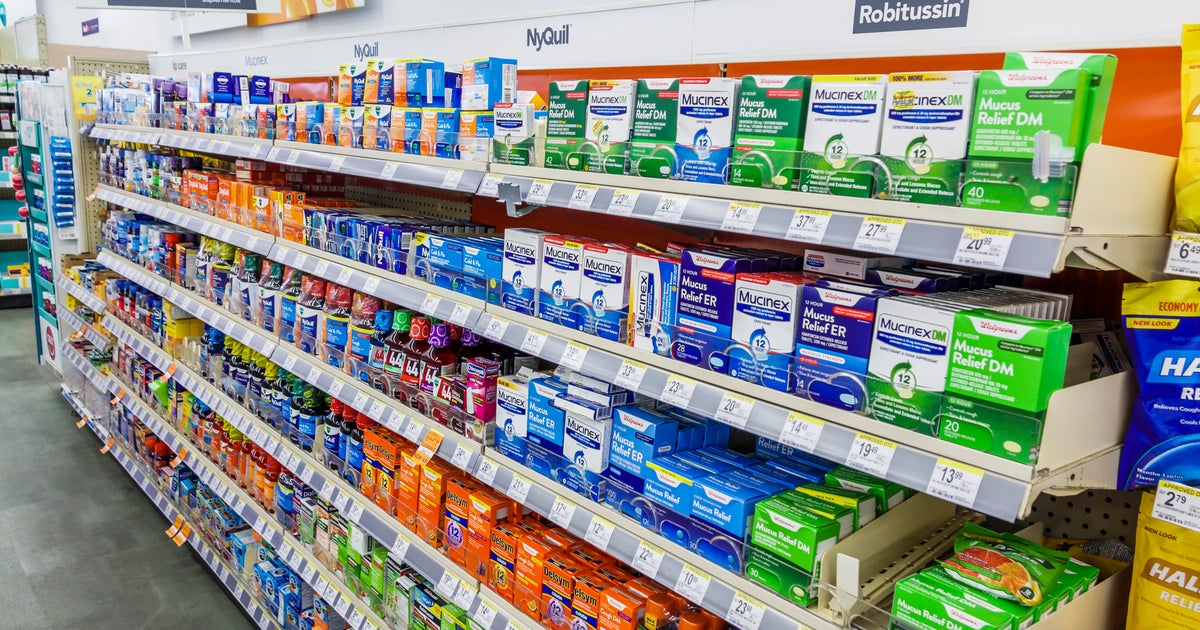CBS News
FDA to pull common but ineffective cold medicine from market

The Food and Drug Administration announced Wednesday that it would seek to pull a widely used ingredient in cough and cold medicines from the market, after the agency’s scientists concluded that the oral version of the drug is ineffective as a nasal decongestant.
The FDA’s proposal comes more than a year after the agency’s outside advisers voted against continued use of the ingredient, called oral phenylephrine, citing concerns with the initial data used to support its approval and new data questioning its effectiveness.
A number of common over-the-counter nasal decongestants have relied on phenylephrine alone or in combination with other ingredients for years, including some cold and cough versions of Advil, NyQuil, Sudafed, Robitussin, Tylenol and Theraflu.
“Based on our review of available data, and consistent with the advice of the advisory committee, we are taking this next step in the process to propose removing oral phenylephrine because it is not effective as a nasal decongestant,” Dr. Patrizia Cavazzoni, director of the FDA’s Center for Drug Evaluation and Research, said in a news release.
The agency’s proposed order would remove oral phenylephrine from the “monograph” of ingredients that drugmakers are allowed to use in cough and cold medicines which are sold on store shelves without a prescription.
The public has until May 7 next year to weigh in on the proposal. After that comment period, if the FDA decides to finalize its proposal to revoke oral phenylephrine’s status as “generally recognized as safe and effective,” over-the-counter drugmakers would be forced to stop using the ingredient.
“The FDA would provide manufacturers with appropriate time to either reformulate drugs containing oral phenylephrine or remove such drugs from the market,” the agency said in its release.
The Consumer Healthcare Products Association said Thursday it was “disappointed” in the FDA’s proposal. The industry trade group renewed its claim that no changes “are warranted” for oral phenylephrine and cited previous FDA and advisory committee decisions that did not call for pulling the ingredient.
“PE should remain an available option for consumers, because Americans deserve the option to choose the safe and effective OTC medicines they prefer and rely on,” Scott Melville, CHPA’s president and CEO, said in a statement.
After the FDA’s advisory committee last year, pharmacy chain CVS said it would pull any products on its shelves that only contained the product.
Spokespeople for drugmakers behind the brands did not immediately respond to requests for comment.
The FDA’s proposal caps a push by pharmacy professors at the University of Florida who have urged the agency for years to pull the product, pointing to new data showing phenylephrine did no better than a placebo when swallowed.
The latest data shows that only a tiny fraction of phenylephrine is absorbed into the body when digested from a pill or syrup containing phenylephrine. This is different from other formulations like the inhaled nasal spray versions of the drug, where larger percentages of the drug can make it into the bloodstream.
The researchers also have questioned the initial studies that were run to prove the drug’s effectiveness, though they acknowledge that it is safe at currently approved levels.
“Let me be clear, oral phenylephrine is not a safety risk,” Hatton, a professor at the University of Florida, told CBS News last year. “It just doesn’t work.”
In a scientific review published this week by the FDA, the agency’s scientists concluded that past studies estimating that higher percentages of the drug could be absorbed during digestion were “an overestimate and based on outdated technology.”
Less than 1% of the drug is absorbed into the bloodstream after being swallowed, they estimated. Far higher doses could “be needed to achieve a clinically meaningful outcome which would raise significant questions about safety.”
“Furthermore, there are no clinical data demonstrating that oral PE is effective as a nasal decongestant at any dosage,” the FDA’s scientists wrote.
CBS News
Canada shuts down TikTok’s Canadian offices, but allows app to remain

Canada announced Wednesday it won’t block access to the popular video-sharing app TikTok but is ordering the dissolution of its Canadian business after a national security review of the Chinese company behind it.
Industry Minister François-Philippe Champagne said it is meant to address risks related to ByteDance Ltd.’s establishment of TikTok Technology Canada Inc.
“The government is not blocking Canadians’ access to the TikTok application or their ability to create content. The decision to use a social media application or platform is a personal choice,” Champagne said.
Champagne said it is important for Canadians to adopt good cybersecurity practices, including protecting their personal information.
He said the dissolution order was made in accordance with the Investment Canada Act, which allows for the review of foreign investments that may harm Canada’s national security. He said the decision was based on information and evidence collected over the course of the review and on the advice of Canada’s security and intelligence community and other government partners.
A TikTok spokesperson said in a statement that the shutdown of its Canadian offices will mean the loss of hundreds of local jobs.
“We will challenge this order in court,” the spokesperson said. “The TikTok platform will remain available for creators to find an audience, explore new interests and for businesses to thrive.”
TikTok is wildly popular with young people, but its Chinese ownership has raised fears that Beijing could use it to collect data on Western users or push pro-China narratives and misinformation. TikTok is owned by ByteDance, a Chinese company that moved its headquarters to Singapore in 2020.
TikTok faces intensifying scrutiny from Europe and America over security and data privacy. It comes as China and the West are locked in a wider tug of war over technology ranging from spy balloons to computer chips.
Canada previously banned TikTok from all government-issued mobile devices. TikTok has two offices in Canada, one in Toronto and one in Vancouver.
Michael Geist, Canada research chair in internet and e-commerce law at the University of Ottawa, said in a blog post that “banning the company rather than the app may actually make matters worse since the risks associated with the app will remain but the ability to hold the company accountable will be weakened.”
Canada’s move comes a day after the election in the United States of Donald Trump. In June, Trump joined TikTok, a platform he once tried to ban while in the White House. It has about 170 million users in the U.S.
Trump tried to ban TikTok through an executive order that said “the spread in the United States of mobile applications developed and owned” by Chinese companies was a national security threat. The courts blocked the action after TikTok sued.
Both the U.S. FBI and the Federal Communications Commission have warned that ByteDance could share user data such as browsing history, location and biometric identifiers with China’s government. TikTok said it has never done that and would not, if asked.
Trump said earlier this year that he still believes TikTok posed a national security risk, but was opposed to banning it.
U.S. President Joe Biden signed legislation in April that would force ByteDance to sell the app to a U.S. company within a year or face a national ban. It’s not clear whether that law will survive a legal challenge filed by TikTok or that ByteDance would agree to sell.
CBS News
Could prison companies get a boost from Trump’s immigration policies?

The Trump administration could be a boon for business for private prison companies in the U.S. if the president-elect delivers on his promise to crack down on illegal immigration.
CoreCivic and Geo Group, the two biggest private prison operators in the U.S., both contract with the U.S. Immigration and Customs Enforcement (ICE) to house detained, undocumented migrants. Their stocks soared Wednesday following Trump’s election win, with investors betting the companies will see increased profits from a tough-on-immigration administration.
CoreCivic, which closed at $13.50 a share on November 5, is trading at $22 a share, while Geo Group, which closed at $15 a share Tuesday, is currently trading at $23.75.
“Obviously, investors believe there is going to be a significant increase in opportunity for both of these firms under the Trump administration,” Noble Capital Markets analyst Joe Gomes told CBS MoneyWatch.
Geo Group executives acknowledged on the company’s third-quarter earnings call Thursday that it expects the incoming administration to enact stricter border security policies and that the company stands “ready to provide additional resources to help ICE meet future needs.”
CoreCivic executives also said they believe the election result will drive demand for its services.
ICE is biggest customer
During Trump’s first term in office, from 2017-2021, immigration detention expanded at record levels, according to an ACLU report. In 2019, ICE detained an average of over 50,000 people each day. At times, that number exceeded 56,000 — about 50% more than peak levels during the Obama administration, according to the report. During his first term in office, Trump expanded the federal government’s use of private prison companies to detain immigrants.
As of January 2020, 81% of people detained in ICE custody across the U.S. were held in facilities owned or managed by private prison corporations, according to the ACLU report.
In his second term, President-elect Trump promises a radical shift in policy at the U.S.-Mexico border from his predecessor. That includes a pledge to oversee the largest deportation operation in American history, which could bring significantly more business to CoreCivic and Geo Group.
For the first nine months of 2024, ICE accounted for 30% of each company’s revenue.
Both Geo Group and CoreCivic said they currently have excess capacity to accommodate a larger population of detainees. CoreCivic executives noted that they’re taking steps to prepare to activate additional capacity to meet ICE’s needs. That could include reconfiguring facilities to accommodate a bigger intake area, they noted.
“There is room for an uptick in occupancy from a capacity standpoint and both companies expect an ask from the Trump administration for more beds. The question is how much, and we just don’t know right now,” Wedbush Securities analyst Brian Violino told CBS MoneyWatch.
Monitoring
Geo Group also provides monitoring services for ICE under its Intensive Supervision Appearance Program (ISAP), a monitoring program using wearable technology that serves as an alternative to detention.
“If there is a finite number of beds and a significant number of people are detained, which Trump is discussing in his plans, there could be an increased usage in this alternative to detention,” Violino said.
Geo Group executives said they have the necessary technology and staffing resources to scale up the contract to more than several million participants, if necessary.
Funding from Congress
The degree to which ICE expands its contracts with the two largest private prison companies depends on how big of an increase in funding Congress authorizes. While Republicans won the Senate majority in Tuesday’s election, it remains to be seen which party will obtain control of the U.S. House of Representatives.
“That’s a big part of the story, and if it’s a Republican sweep, it will be easier for Trump to get funding from Congress to support this operation he’s looking to do,” Violino said.
CBS News
What’s next for Harris, Trump after the 2024 elections

Watch CBS News
Be the first to know
Get browser notifications for breaking news, live events, and exclusive reporting.








